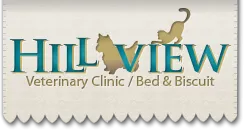When Your Senior Cat Should See the Vet
posted: May 21, 2018.
Your beautiful white indoor cat, Snowball, has been an active part of your family for years. She’s always loved batting at cat toys, playing in cardboard boxes, and chasing imaginary mice up and down the hall. Lately, though, you’ve noticed that 12-year-old Snowball is not quite herself these days. She’s not playing as much, is definitely eating less, and she’s developed a few other quirks that concern you. To ease your mind about Snowball’s health, schedule a visit to your Reynoldsburg veterinarian to discover the underlying cause of your cat’s symptoms.
Behavioral issues – Keep a close eye on Snowball’s daily routine, as your written observations might help your vet learn about your cat’s medical issues. She’s always been very affectionate, but lately she seems to be avoiding her belly-scratching sessions, often even crawling under the furniture to get away from you. Sometimes Snowball even seems aggressive, growling and hissing at familiar family members.
Nutritional changes – If Snowball’s weight has always been normal, but she’s starting to appear a little gaunt even though she eats normally, something’s clearly out of kilter. Or maybe she’s not interested in food at all, rarely eating more than a few bites even though she’s always been a hearty eater. Either way, Snowball is a great candidate for a nutrition and weight management consultation with your vet.
Urinary and intestinal symptoms – For some unexplained reason, Snowball the litter box queen has begun to urinate everywhere except her familiar box. You’ve also noticed a change in her water consumption habits. Even worse, poor Snowball has developed a nasty case of diarrhea, which means she leaves unwelcome presents throughout the house.
Pinpointing the Problem – Just like senior humans with puzzling medical symptoms, older cats can benefit from many types of diagnostic tests. Your veterinarian can order a Comprehensive Blood Panel, along with a urinalysis that can uncover kidney and bladder problems. He can view chest x-rays of Snowball’s heart and lungs, or see abdominal x-rays that showcase her inner intestinal workings. She can even receive an electrocardiogram, or ECG, which helps your vet uncover any heart issues.
As your Reynoldsburg veterinarian evaluates Snowball’s symptoms and determines the best course of action, remember that he wants to help Snowball maintain her good health in her twilight years. After all, your senior cat still has plenty of love to give to you and your family.
